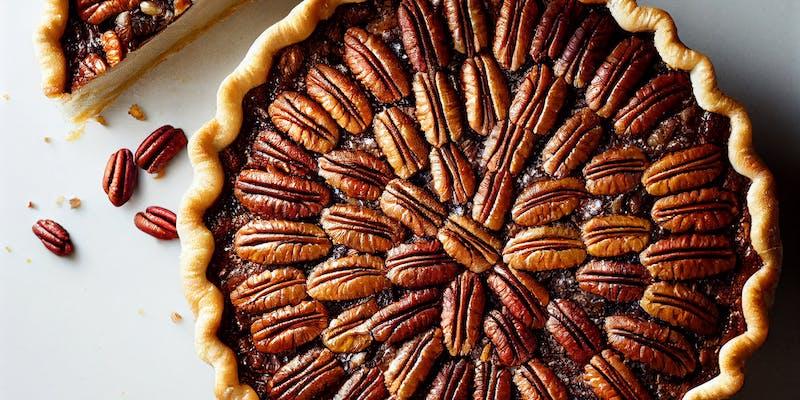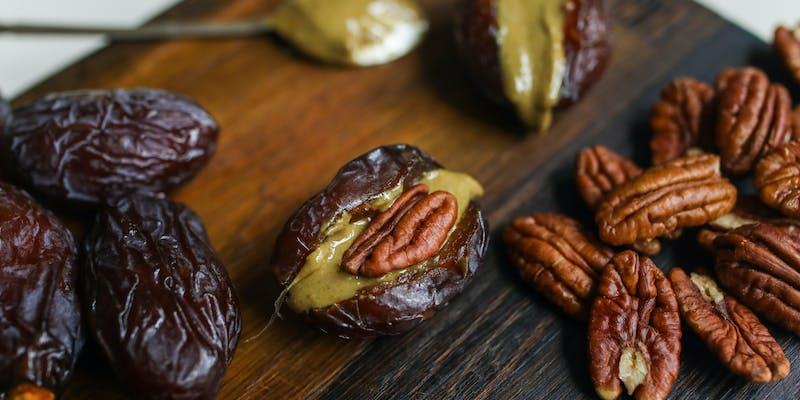What Are Top Nutritional Facts About Pecan? Health Benefit Analysis
Dec 23, 2023 By Madison Evans
Pecans are known for their sweetness in pecan pie, but they are adaptable in other dishes. Pecans go from pie filling to a healthy nut that shines on its own and in savory dishes. In addition to delectable confections, nuts lend crunch and taste to hearty veggie preparations. People may think of rich treats when they hear the word "pecans," but they can be used for much more. Discovering nuts' nutty flavor in savory foods expands your culinary options. Pecans are healthy and may be used as a dessert, snack, or tasty complement to delicious dishes.
Nutrition Facts
The USDA nutritional profile for 1 ounce (28g) pecan halves (about 19 halves) is healthy. A delicious crunch, pecan nutritional value includes:
- 196 calories and 20g of healthy fats
- 4g of carbs
- 2.7g of fiber
- No sodium
- 1.1g of sugars
- 2.6g of protein
- 0.7mg of iron
- 34.4mg of magnesium
- 1.3mg of zinc
Fats
Pecan halves are low-carb, with only 4 grams of carbs per one-ounce serving. Most of these carbohydrates are dietary fiber, highlighting their healthiness. For carbohydrate watchers, pecans are ideal.
Carbohydrates
Pecan halves are low-carb, with only 4 grams of carbs per one-ounce serving. Most of these carbohydrates are dietary fiber, highlighting their healthiness. For carbohydrate watchers, pecans are ideal. Pecans are a healthy, carb-conscious supplement to a balanced diet since their fiber aids digestion and regulates blood sugar.
Vitamins And Minerals
Pecans nutrition bars include several vitamins and minerals that enhance their nutritional value:
- Fat-soluble vitamins: Pecans boast fat-soluble vitamins, such as vitamin E (an antioxidant) and vitamin A (beneficial for eyesight and immunity).
- Vitamin B: Pecans' rich array of B vitamins contributes significantly to metabolism and overall health.
- Minerals: Essential minerals found in pecans include potassium for cardiovascular health, phosphorus for bone strength, magnesium for muscle and nerve function, calcium for bone health, and zinc for immunological support.
Health Benefits

Pecans are a tasty snack that promotes heart health and antioxidants against oxidative stress. A few more Pecan health facts are:
Control Diabetes
Pecans help control diabetes in several ways. Rich in healthful fats and low in carbs, they reduce blood sugar rises. Pecans provide consistent energy without affecting glucose levels, lowering blood sugar swings. Pecans are diabetes-friendly because their fiber content stabilizes blood sugar. Studies show that eating more tree nuts like pecans without increasing calorie intake will improve diabetic indicators. Pecans can lower hemoglobin A1c and fasting glucose, making them a promising diabetic diet ingredient.
Maintains Heart Health
The American Heart Association's Heart-Check Program certifies raw and unsalted pecans as heart-healthy because of their minimal saturated fat and sodium content. Pecans' potassium and fiber levels regulate blood pressure and cholesterol, improving cardiovascular health. Eating a handful of whole pecans every day lowers LDL and total cholesterol. This shows that pecans may be a tasty and easy heart-healthy snack. Incorporating pecans into a balanced diet supports cardiovascular health and offers flexibility beyond desserts.
Maintains Weight
Weight management is possible with tree nuts like pecans and other NHANES nuts. Even though nuts are high in calories, they may reduce BMI and waist circumference. Despite their high-calorie count, pecans are strong in nutrients, making them satisfying and keeping you full. Pecans' healthful fats and fiber stabilize blood sugar, minimizing hunger-inducing troughs and surges. Pecans are a terrific addition to a balanced diet for weight loss or maintenance since they help you feel full.
Moderation is crucial to pecans nutrition bars and calorie control. Following a handful or 1/4 cup serving size helps people enjoy pecans' nutritional benefits while watching their calorie intake. This method is sustainable and healthy for adding pecans to a weight-loss diet.
Helps In Digestion
The fiber in pecans and other plant-based meals helps preserve digestive health. Fiber promotes regular bowel motions and may reduce the risk of intestinal cancer. Fiber is essential to physical health because it helps eliminate toxins and promotes gut flora.
Pecans provide 3 grams of fiber every 1/4 cup, helping fulfill the daily recommendation of 25–35 grams. Pecans are a tasty and practical method to boost fiber consumption, which promotes digestive regularity and gut health.
Prevents Cancer
A 20-year study of nearly 62,000 women found an adverse relationship between peanut and tree nut intake and post-menopausal breast cancer. A substantial link shows that eating 10 grams of nuts daily might lower the risk of some cancers. This supports earlier findings that nut consumption reduces cancer mortality, highlighting its preventative effects. The findings suggest that nuts like pecans may promote long-term health and reduce the incidence of post-menopausal breast cancer, offering another incentive to incorporate them into a balanced diet.
Varieties of Pecans
The pecan universe is vast, with over 1,000 kinds. Developers typically name these kinds after their origins, tribes, or funny names like Moneymaker or Kernoodle. The variety of pecans shows their flexibility and versatility across locations and farming approaches.
Pecans are sold in several varieties to suit different tastes. Pecans can be raw, roasted, salted, or shelled. Ground pecan meal and flour lend nutty depth to recipes and are versatile. Growers sell pecan granules, finely chopped pecans, by mail order. Pecan butter and oil provide distinct flavors and health advantages for those seeking alternatives.
Considerations

Since pecans are in the same family as tree nuts, anyone with tree nut allergies should avoid them. Avoid pecans and related products until they are safe if you have a tree nut allergy. Remember that allergies to one tree nut increase the likelihood of responding to others in the same family.
Pecan and other tree nut allergies can cause itching, swelling, or life-threatening anaphylaxis. Rapid and severe allergic reactions like anaphylaxis require quick medical intervention. For pecan allergies, your doctor may prescribe carrying an epinephrine auto-injector. This gadget quickly administers life-saving epinephrine to treat severe allergic responses. Epinephrine is essential for treating and minimizing the potentially powerful effects of a pecan allergy, highlighting the significance of monitoring and preventive actions for tree nut allergy sufferers.







